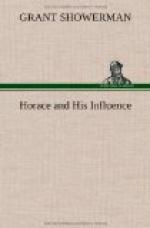And yet, numbers of men possessed of experience as abundant have died without being poets, or even wise men. Their experience was held in solution, so to speak, and failed to precipitate. Horace’s experience did precipitate. Nature gave him the warm and responsive soul by reason of which he became a part of all he met. Unlike most of his associates among the upper classes to which he rose, his sympathies could include the freedman, the peasant, and the common soldier. Unlike most of the multitude from which he sprang, he could extend his sympathies to the careworn rich and the troubled statesman. He had learned from his own lot and from observation that no life was wholly happy, that the cares of the so-called fortunate were only different from, not less real than, those of the ordinary man, that every human heart had its chamber furnished for the entertainment of Black Care, and that the chamber was never without its guest.
But not even the precipitate of experience called wisdom will alone make the poet. Horace was again endowed by nature with another and rarer and equally necessary gift,—the sense of artistic expression. It would be waste of time to debate how much he owed to native genius, how much to his own laborious patience, and how much to the good fortune of generous human contact. He is surely to be classed among examples of what for want of a better term we call inspiration. The poet is born. We may account for the inspiration of Horace by supposing him of Greek descent (as if Italy had never begotten poets of her own), but the mystery remains. In the case of any poet, after everything has been said of the usual influences, there is always something left to be accounted for only on the ground of genius. It was the possession of this that set Horace apart from other men of similar experience.
The poet, however, is not the mere accident of birth. Horace is aware of a power not himself that makes for poetic righteousness, and realizes the mystery of inspiration. The Muse cast upon him at birth her placid glance. He expects glory neither on the field nor in the course, but looks to song for his triumphs. To Apollo,
“L_ord of the enchanting shell_,
P_arent of sweet and solemn-breathing
airs_,”
who can give power of song even unto the mute, he owes all his power and all his fame. It is the gift of Heaven that he is pointed out by the finger of the passer-by as the minstrel of the Roman lyre, that he breathes the divine fire and pleases men. But he is as perfectly appreciative of the fact that poets are born and also made, and condemns the folly of depending upon inspiration unsupported by effort. He calls himself the bee of Matinum, industriously flitting with honeyed thigh about the banks of humid Tibur. What nature begins, cultivation must develop. Neither training without the rich vein of native endowment, nor natural talent without cultivation, will suffice; both must be friendly conspirators in the process of forming the poet. Wisdom is the beginning and source of writing well. He who would run with success the race that is set before him must endure from boyhood the hardships of heat and cold, and abstain from women and wine. The gift of God must be made perfect by the use of the file, by long waiting, and by conscious intellectual discipline.




